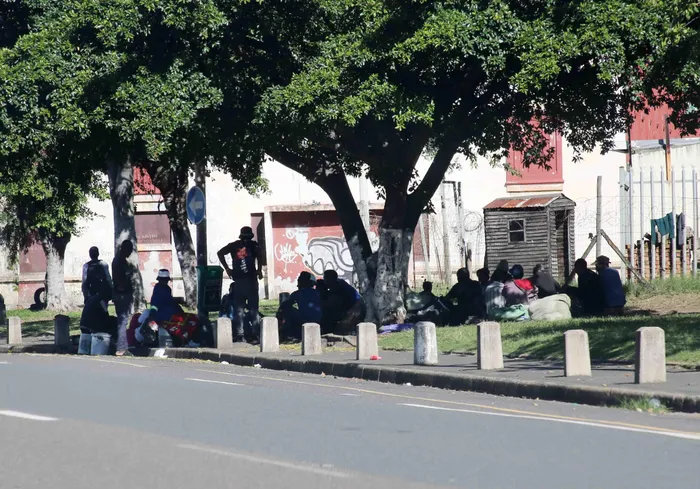
Homeless people near Durban Station. The eThekwini Municipality's plan to relocate homeless people to the Sakhithemba shelter in Lower Illovo has raised concern.
Image: Tumi Pakkies / Independent Newspapers
Concerns have been raised by the city's homeless residents about the eThekwini Municipality's plan to relocate them to the new Sakhithemba homeless shelter in Lower Illovo, with many saying they were not adequately consulted and are worried about the distance from the city, livelihoods, and support services.
About 60 to 70 homeless people attended a meeting at the Denis Hurley Centre (DHC) in Durban on Thursday to discuss the relocation plan. The meeting followed a visit to Sakhithemba, south of Durban, on Tuesday, where a smaller group of homeless residents, accompanied by the DHC, inspected the premises.
At Thursday's meeting, some participants said municipal shelters did not provide consistent meals and that promised job opportunities following training had not materialised. Others said they relied on churches and donors for daily sustenance.
Those who had visited Sakhithemba, which is under construction, said they were impressed by the building but raised practical concerns. They said the centre was too far from the city for them to maintain informal work, that the surrounding community was unwelcoming, and that there had been little direct consultation with the municipality.
DHC director Raymond Perrier said the city’s Sakhithemba plan had been developed without proper engagement with homeless people, the very group it is meant to serve.
“They claim they’ve done consultation, but I have not met a single person they consulted, and they haven’t consulted with us. We’re the largest NGO working with homeless people in Durban, and they haven’t engaged the National Homeless Network to learn from other examples around the country. Some projects have done well, some badly, but they haven’t tried to learn from any of them,” he said.
Perrier said the plan itself was flawed. “The centre is too far away. People do not want to be there. You cannot make people go there, and you cannot make people stay there.
“Sakhithemba might be a good idea, or it might not, but it cannot work if the very people expected to live there have not been part of shaping it.”
Homeless participants listed conditions they said would make relocation acceptable, including job opportunities and skills development, sports and recreation facilities, a clinic and mobile Home Affairs services, easy access to social services, transport to the city, a library, consistent food, and security.
David Wesley, one of the homeless attendees, said there was a lack of clear communication from the city and also suggested the DHC might have its own interests.
“I am of the view that Denis Hurley sends its operational teams into the Durban CBD, and if we move out of the city, they would not get funding. Their concern seems more about the organisation’s funding than about us,” he said.
However he said if the homeless were moved to Illovo, it would be difficult for them to find jobs.
“We survive by doing small jobs recycling, car washing, guarding cars, things that aren’t possible in Illovo. If the city wants to help us, it must first talk to us. Public participation is essential.”
Another homeless person, who asked not to be named, said some attendees at Tuesday’s visit to the shelter were encouraged to oppose the relocation. “They were told to tell other homeless people that the centre is far away and unsuitable,” he said.
Other homeless participants said the central problem was not the centre itself but the lack of transparent communication and genuine consultation. “The building is good, but if we cannot survive or work there, what’s the point?” said one participant. “We are not against moving; we just want the truth and to be involved in decisions that affect our lives.”
In response to the some of the comments made, Perrier denied that people were told what to say.
“As you saw they were given an open floor to say what they wanted and to speak in English or Zulu. We didn't need to tell them how far the site is. They saw that for themselves which is one of the reasons we drove them there.”
Perrier added that the DHC works with homeless people and refugees and even if some of the homeless move to the Sakhithemba there would still be several people who need help.
“We do not receive any funding from the municipality so where they spend their money does not affect us. But if they want to spend over R10 million to help homeless people we would prefer it to be a project that works rather than one that is designed to fail. That's why we asked the group to say what would they need for Sakithemba to work.”
In a statement on Friday, the municipality said deputy mayor Zandile Myeni, wjo is also chairperson of the Security and Emergency Services Committee, had engaged with homeless residents on Thursday who are set to benefit from the Sakhithemba Homeless Shelter.
She said the shelter represents dignity, opportunity and a pathway to economic inclusion for the homeless.
“We are ensuring that the facility meets all required standards and that residents are kept informed about the project,” said Myeni.
She also expressed concern about allegations of sabotage, stating that some individuals have embarked on a deliberate campaign to discredit the project and rally the community against it.
“We will not allow misinformation or divisive tactics to derail a project that is designed to uplift and empower,” she said.
The City said the shelter will offer safe accommodation, skills development, job opportunities, and access to social services, including social workers, a library, and learnership programmes.
Related Topics: